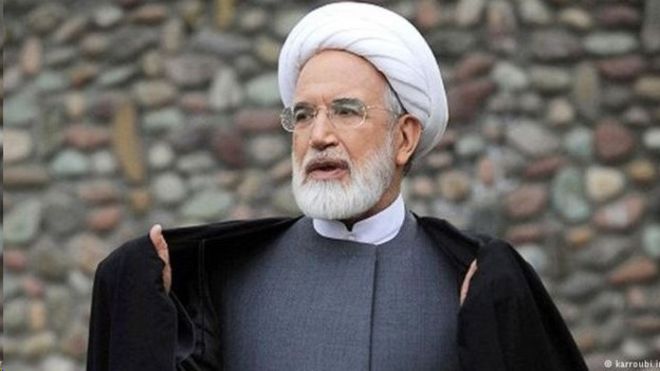MPs Say Efforts “Continuing” to Free Opposition Leaders Amid Karroubi’s Hospitalization

Former presidential candidate Mehdi Karroubi has been under extrajudicial house arrest since 2011.
Hospital Visit Could be “Step Towards” Ending House Arrests
A member of Parliament who has been blocked from visiting detained opposition leader Mehdi Karroubi in the hospital has revealed that negotiations are ongoing to resolve the extrajudicial house arrests of Karroubi and two other opposition leaders.
“We are still continuing these efforts,” said reformist MP Ahmad Mazani in an interview with the state-funded Iranian Labor News Agency (ILNA) on July 26. “The reason we asked for the visit is that we have to take the initiative away from extremist elements.”
“If judicial officials, the president and the Supreme National Security Council cooperate with us, this meet and greet could be a step towards resolving this problem,” he said.
“We asked that arrangements be made for MPs to visit Mr. Karroubi because we were worried about his illness,” said Mazani, adding that four MPs had been denied entry into the hospital. “I think the meeting could benefit the country.”
Former presidential candidates Karroubi (79) and Mir Hosseini Mousavi (75) and Mousavi’s wife Zahra Rahnavard (71) have been under house arrest without trial since 2011 for challenging the outcome of the 2009 presidential election and leading the mass peaceful protests that came to be known as the Green Movement.
The protests were violently suppressed by the state and the media have been instructed not to report on the house arrests. The 2009 protests continue to be referred to as the “sedition” by authorities in Iran.
Despite Supreme Leader Ali Khamenei’s order for the extrajudicial detentions to continue until the opposition leaders apologize for leading the Green Movement, moderate political factions in Iran have continued to press for a mutually acceptable solution.
The gradual ending of the house arrests will begin when MPs can visit the detainees,” tweeted Nahid Molavi, a journalist for Etemad newspaper, on July 26. “We demand MPs visit the detainees. Ending the house arrests will be in the country’s interest.”
Blocked Hospital Visits
Since Karroubi’s transfer to the hospital on July 24, security forces at Omid Hospital in Tehran have turned away all visitors except immediate family members. Two days after Karroubi was admitted, the opposition leader underwent a TIPS procedure that corrected a vein blockage, according to his son, Hossein Karroubi.
After being blocked from visiting Karroubi, reformist MP Elyas Hazrati tweeted on July 26: “People’s representatives have the right to pursue the wishes of the people. Unfortunately despite much effort and negotiation at the hospital during last night and this morning, it was not possible to visit [Karroubi].”
Hazrati included the Persian hashtag for “detainees,” which has been used by Iranian social media activists to raise attention to the house arrests and demand a resolution to the political standoff.
First Deputy Parliament Speaker Ali Motahhari, a conservative MP and strong proponent of freeing the opposition leaders, said the deterioration of their health should be seen as an opportunity to end the “tragic” saga.
“Mr. Karroubi’s heart disease and his transfer to the hospital is a good opportunity to use some wisdom to end this tragic house arrest saga,” he tweeted on July 24.
The opposition news site Kalame reported on July 26 that Mousavi is suffering from various ailments compounded by years of isolation under house arrest.
“Last night Mir Hossein’s daughters and Mrs. Rahnavard noticed major fluctuations in his blood pressure along with severe dizziness, which has not been treated for a long time and is now getting worse,” according to the report. “Also, Mr. Mousavi’s kidney problem has become worryingly chronic and in need of a thorough examination.”
Asieh Bakeri, the prominent daughter of an Iran-Iraq War (1980-88) veteran who supports reformist policies, suggested that senior officials including President Hassan Rouhani break the stalemate by trying to visit Mousavi and Rahnavard at their house and prison in Tehran.
“They won’t be allowed in, but a few legislators, cabinet ministers and Rouhani should get up and go to the gate of the prison on Akhtar St,” tweeted Bakeri on July 26. “At least it would feel good that they did something.”
Ending the house arrests was one of Rouhani’s top pledges during his 2013 election campaign.
At a campaign rally at Sharif University on May 13, 2013, Rouhani said he hoped he could free the three detainees within the first year of his presidency: “We can provide conditions such that over the next year, individuals who were imprisoned or put under house arrest for the 2009 events are released.”
However, after his re-election on May 19, 2017, Rouhani adopted a more cautious line and suggested that a solution depends on cooperation from other branches of state.
“The country is ruled by laws and we should all submit to them,” he said on May 22. “The executive, legislative and judicial branches have their own responsibilities. We are moving forward on the basis of the Constitution.”





